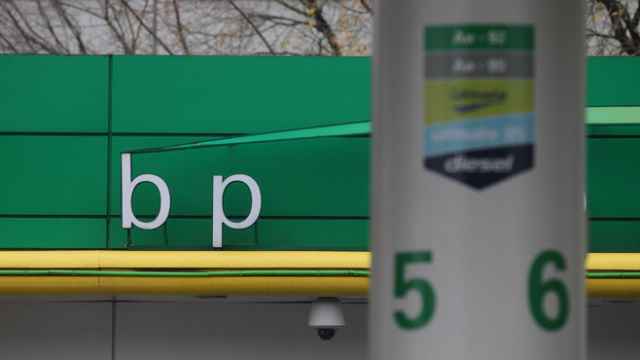LONDON — BP's third-quarter results took a hit from declining oil prices and a sharp drop in income from Russia as Western sanctions on Moscow led to a slump in earnings from the oil major's local partner, Kremlin-controlled Rosneft.
BP's overall profits were broadly in line with expectations at $3 billion but down nearly a fifth year-on-year. Its stock posted modest gains as investors welcomed a 5.3 percent year-on-year increase in dividends to 10 cents per share.
"Despite the positive financial results the company still faces two significant headwinds — in Russia and liabilities over the 2010 Gulf of Mexico oil spill," said Iain Reid, analyst at investment bank BMO.
BP, a major investor in Russia through a 19.75 percent stake in state oil major Rosneft, said the fall of the ruble against the dollar had a significant impact on results.
Underlying net income from Rosneft for the quarter was $110 million compared with $808 million a year earlier.
The ruble has lost more than a fifth of its value since the start of the year as the Kremlin fights capital outflows and lower oil prices, while local businesses have been shut off from Western lending by sanctions imposed by the United States and the European Union over Moscow's intervention in Ukraine.
The latest sanctions hit long-term financing and joint projects with Western companies in the Arctic, and shale developments.
Rosneft is expected to post a quarterly loss and on Tuesday the company delayed publication of its third-quarter results by a day without explanation.
Unlike its rivals, BP has nearly no production in Russia outside Rosneft. Rival ExxonMobil, Royal Dutch Shell and France's Total have all suspended joint shale oil and Arctic projects in Russia in recent months, jeopardizing plans by Moscow to sustain output and exports, key sources of revenue for the state budget.
Oil companies have seen billions wiped off their stock market values as crude prices dropped by 25 percent over the past four months to a four-year low of near $85 a barrel due to slowing global demand, particularly in China, and ample supplies.
The impact of the falling oil prices on BP was however limited as the third quarter finishes at the end of September.
Chief financial officer Brian Gilvary said in a conference call that most projects were based on an oil price of $80 per barrel, allowing the company "a lot of flexibility to withstand a period of low oil prices," adding that the lower oil prices even offer buying opportunities.
BP maintained its $3.5 billion liabilities provision for the 2010 Gulf of Mexico rig explosion and spill, even after a U.S. judge last month found it "grossly negligent" and "reckless" in the disaster.
BP said it would appeal the ruling, which could add nearly $18 billion in fines to more than $42 billion in charges the company took for the worst offshore environmental disaster in U.S. history.
By the end of the third quarter, cumulative charges paid into the Deepwater Horizon Oil Spill Trust reached their allocated limit of $20 billion and any additional costs "will be charged to the income statement as they arise."
A Message from The Moscow Times:
Dear readers,
We are facing unprecedented challenges. Russia's Prosecutor General's Office has designated The Moscow Times as an "undesirable" organization, criminalizing our work and putting our staff at risk of prosecution. This follows our earlier unjust labeling as a "foreign agent."
These actions are direct attempts to silence independent journalism in Russia. The authorities claim our work "discredits the decisions of the Russian leadership." We see things differently: we strive to provide accurate, unbiased reporting on Russia.
We, the journalists of The Moscow Times, refuse to be silenced. But to continue our work, we need your help.
Your support, no matter how small, makes a world of difference. If you can, please support us monthly starting from just $2. It's quick to set up, and every contribution makes a significant impact.
By supporting The Moscow Times, you're defending open, independent journalism in the face of repression. Thank you for standing with us.
Remind me later.






